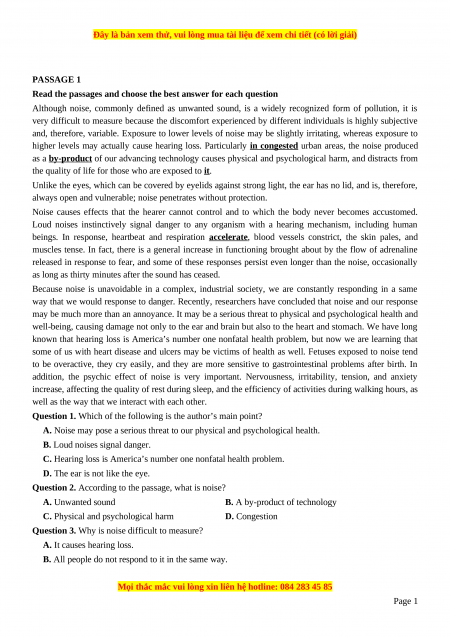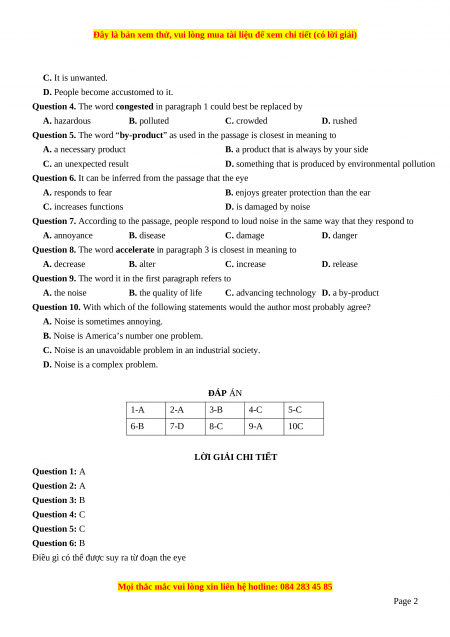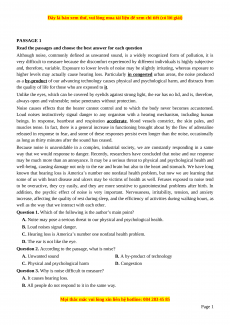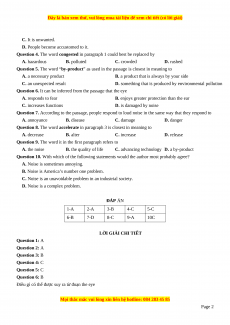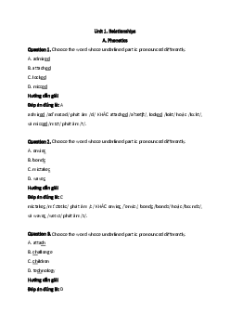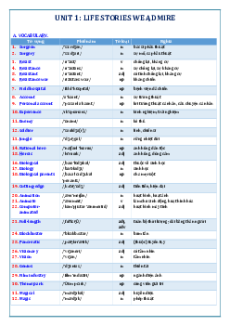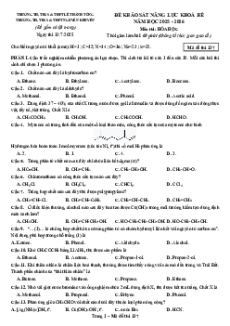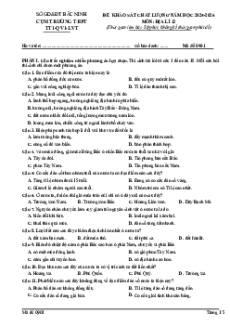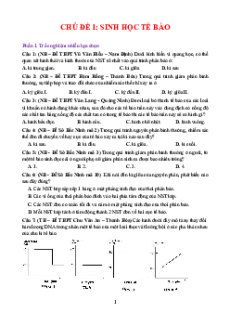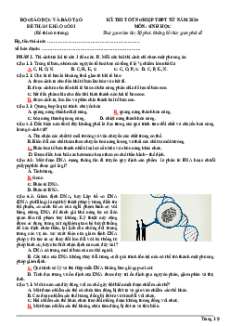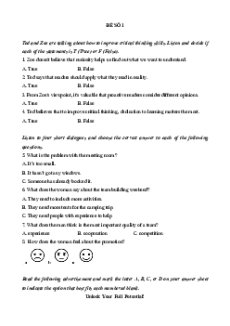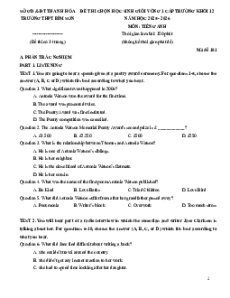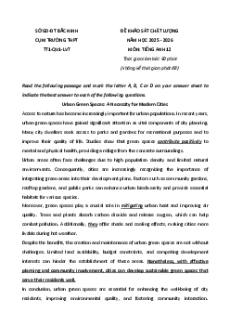PASSAGE 1
Read the passages and choose the best answer for each question
Although noise, commonly defined as unwanted sound, is a widely recognized form of pollution, it is
very difficult to measure because the discomfort experienced by different individuals is highly subjective
and, therefore, variable. Exposure to lower levels of noise may be slightly irritating, whereas exposure to
higher levels may actually cause hearing loss. Particularly in congested urban areas, the noise produced
as a by-product of our advancing technology causes physical and psychological harm, and distracts from
the quality of life for those who are exposed to it.
Unlike the eyes, which can be covered by eyelids against strong light, the ear has no lid, and is, therefore,
always open and vulnerable; noise penetrates without protection.
Noise causes effects that the hearer cannot control and to which the body never becomes accustomed.
Loud noises instinctively signal danger to any organism with a hearing mechanism, including human
beings. In response, heartbeat and respiration accelerate, blood vessels constrict, the skin pales, and
muscles tense. In fact, there is a general increase in functioning brought about by the flow of adrenaline
released in response to fear, and some of these responses persist even longer than the noise, occasionally
as long as thirty minutes after the sound has ceased.
Because noise is unavoidable in a complex, industrial society, we are constantly responding in a same
way that we would response to danger. Recently, researchers have concluded that noise and our response
may be much more than an annoyance. It may be a serious threat to physical and psychological health and
well-being, causing damage not only to the ear and brain but also to the heart and stomach. We have long
known that hearing loss is America’s number one nonfatal health problem, but now we are learning that
some of us with heart disease and ulcers may be victims of health as well. Fetuses exposed to noise tend
to be overactive, they cry easily, and they are more sensitive to gastrointestinal problems after birth. In
addition, the psychic effect of noise is very important. Nervousness, irritability, tension, and anxiety
increase, affecting the quality of rest during sleep, and the efficiency of activities during walking hours, as
well as the way that we interact with each other.
Question 1. Which of the following is the author’s main point?
A. Noise may pose a serious threat to our physical and psychological health.
B. Loud noises signal danger.
C. Hearing loss is America’s number one nonfatal health problem.
D. The ear is not like the eye.
Question 2. According to the passage, what is noise? A. Unwanted sound
B. A by-product of technology
C. Physical and psychological harm D. Congestion
Question 3. Why is noise difficult to measure?
A. It causes hearing loss.
B. All people do not respond to it in the same way.
Page 1
C. It is unwanted.
D. People become accustomed to it.
Question 4. The word congested in paragraph 1 could best be replaced by A. hazardous B. polluted C. crowded D. rushed
Question 5. The word “by-product” as used in the passage is closest in meaning to A. a necessary product
B. a product that is always by your side
C. an unexpected result
D. something that is produced by environmental pollution
Question 6. It can be inferred from the passage that the eye A. responds to fear
B. enjoys greater protection than the ear C. increases functions D. is damaged by noise
Question 7. According to the passage, people respond to loud noise in the same way that they respond to A. annoyance B. disease C. damage D. danger
Question 8. The word accelerate in paragraph 3 is closest in meaning to A. decrease B. alter C. increase D. release
Question 9. The word it in the first paragraph refers to A. the noise B. the quality of life
C. advancing technology D. a by-product
Question 10. With which of the following statements would the author most probably agree?
A. Noise is sometimes annoying.
B. Noise is America’s number one problem.
C. Noise is an unavoidable problem in an industrial society.
D. Noise is a complex problem. ĐÁP ÁN 1-A 2-A 3-B 4-C 5-C 6-B 7-D 8-C 9-A 10C LỜI GIẢI CHI TIẾT Question 1: A Question 2: A Question 3: B Question 4: C Question 5: C Question 6: B
Điều gì có thể được suy ra từ đoạn the eye
Page 2
A. đáp lại sự sợ hãi B. thích bảo vệ hơn tai C. tăng chức năng
D. bị hư hại do tiếng ồn Question 7: D Question 8: C Question 9: A Question 10: C
Với những phát biểu nào sau đây, tác giả có thể đồng ý nhất?
A. Tiếng ồn đôi khi gây khó chịu.
B. Tiếng ồn là vấn đề số một của Mỹ.
C. Tiếng ồn là một vấn đề không thể tránh khỏi trong một xã hội công nghiệp.
D. Tiếng ồn là một vấn đề phức tạp.
Page 3
MUA NGAY ĐỂ XEM TOÀN BỘ TÀI LIỆU
CÁCH MUA:
- B1: Gửi phí vào TK:
1133836868- CT TNHH DAU TU VA DV GD VIETJACK - Ngân hàng MB (QR) - B2: Nhắn tin tới Zalo VietJack Official ( nhấn vào đây ) để xác nhận thanh toán và tải tài liệu - giáo án
Liên hệ ngay Hotline hỗ trợ: 084 283 45 85
Chúng tôi đảm bảo đủ số lượng đề đã cam kết hoặc có thể nhiều hơn, tất cả có BẢN WORD, LỜI GIẢI CHI TIẾT và tải về dễ dàng.
Để tải tài liệu gốc về máy bạn click vào nút Tải Xuống ở trên!
- Tailieugiaovien.com.vn giới thiệu 400 bài tập Đọc - Hiểu Tiếng Anh Moon ID mới nhất nhằm giúp Giáo viên có thêm tài liệu tham khảo tài liệu ôn thi THPT Quốc Gia môn Tiếng Anh.
- File word có lời giải chi tiết 100%.
- Mua trọn bộ sẽ tiết kiệm hơn tải lẻ 50%.
Đánh giá
4.6 / 5(993 )5
4
3
2
1
Trọng Bình
Tài liệu hay
Giúp ích cho tôi rất nhiều
Duy Trần
Tài liệu chuẩn
Rất thích tài liệu bên VJ soạn (bám sát chương trình dạy)
